| Medina of Salé | |
|---|---|
| Native name Arabic: المدينة القديمة لسلا | |
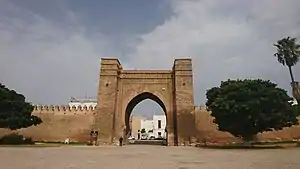 Bab Lamrissa, the biggest gate of the medina of Salé | |
| Type | medina quarter |
| Location | Salé, Morocco |
| Coordinates | 34°02′1.53″N 6°49′12.45″W / 34.0337583°N 6.8201250°W |
| Area | 90 ha [1] |
| Founded | 1030 |
| Founder | Banu Ifran dynasty |
| Architectural style(s) | Moroccan |
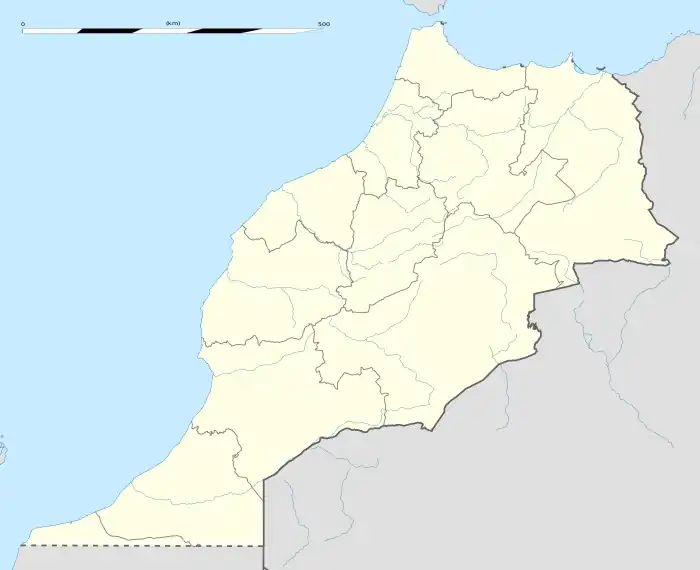 Location of Medina of Salé in Morocco | |
The Medina of Salé, or Salé old town (in Arabic: المدينة العتيقة لسلا) is the medina quarter and the oldest walled part in the city of Salé in Morocco. It is classified as a national cultural heritage since October 1914,[2] and is considered as one of the oldest medinas of Morocco.[3]
History
Salé, in the time of the Ifrenids, was very difficult to besiege, which made it very difficult for the Almohads to conquer the city. Under the order of the Almohad Caliph Abd al-Mu'min, they decided to destroy the ramparts. Adopting the same motto as his grandfather, Abu Yusuf Yaqub al-Mansur had the Salé enclosure rebuilt on the north and south-east side in 1196.
However, the area facing the sea remained uncovered, which resulted on the greatest disaster of the history of the city and led the Castilians to raid Salé in 1260. The Marinid sultan Abu Yusuf Yaqub ibn Abd al-Haqq built in 1261, on the site of the Spanish attack, a bastion that he named after the massacre Borj Adoumoue ("bastion of Tears"), in reference to the tears he dropped to mourn the victims.
City walls
The medina is surrounded by a nearly 4.3 km long wall, containing several gates, most of which have remained and are still of use until today. The oldest parts of the wall date back to the Almoravid dynasty (1054-1164), while the newest ones are from the Alaouite era. Some of the notable gates and bastions of the medina of Salé are:
Gates
- Bab Bouhaja - Demolished in 1969
- Bab Chaafa
- Bab Cordoba
- Bab Dar Sanaa
- Bab Ferd
- Bab Jdid
- Bab Lamrissa - Built between 1270 and 1280, with 9 meters width and 9.6 meters height. It is the biggest city gate in Salé and in Morocco.[4]
- Bab Lekhmis - Also called Bab Fès
- Bab Maalqa
- Bab Sebta - Referring to the city of Ceuta, as it points towards the north.
Bastions
- Borj Bab Sebta - Built in 1738
- Borj Addoumoue (Bastion of tears) - Also called the old Skalla - Built in 1261 to protect the city from invasions coming from the Atlantic Ocean
- Borj Rokni - Also called the new Skalla - Built in 1853
- Borj Mellah
Monuments
The medina of Salé hosts a number of historical buildings and monuments built at different times. These include:
- The Great Mosque of Salé, the largest and most important mosque in the city, rebuilt over different periods
- The Marinid Madrasa, built in 1341
- Maristane of Salé
- Sidi Benacher Mausoleum
- Sidi Abdellah Benhassoun Mausoleum
Pictures
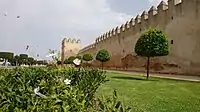 Part of Salé Medina wall
Part of Salé Medina wall Information on Salé wall made by the Moroccan ministry of culture
Information on Salé wall made by the Moroccan ministry of culture
 Entrance of the great mosque of Salé
Entrance of the great mosque of Salé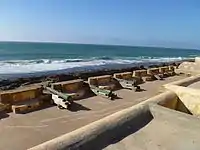 Borj Addoumoue
Borj Addoumoue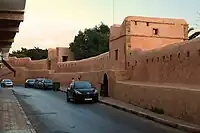 Fortess near Bab Maalqa
Fortess near Bab Maalqa View over the Atlantic Ocean from the wall of Salé
View over the Atlantic Ocean from the wall of Salé Old gate of the medina
Old gate of the medina Sidi Abdellah Benhassoun mauseleum
Sidi Abdellah Benhassoun mauseleum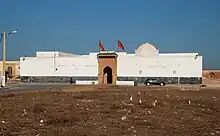 Sidi Benacher mauseleum
Sidi Benacher mauseleum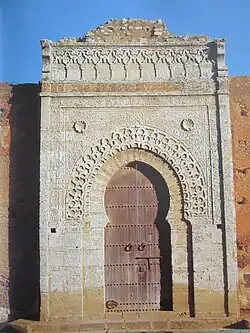
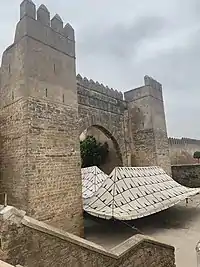 Bab Dar Sanaa
Bab Dar Sanaa Bab Cordoba
Bab Cordoba
References
- ↑ Information about the city of Salé - Official Website of Salé Commune (French)
- ↑ Sale: Morocco's discrete tourism attraction on the Atlantic coast - The Arab Weekly (2018)
- ↑ History of Salé - Official Website of Salé Commune (Arabic)
- ↑ The old town of Salé - Official Website of the city of Salé (Arabic)
External links
- Images of the Medina Wall in Manar al-Athar digital image resource archive